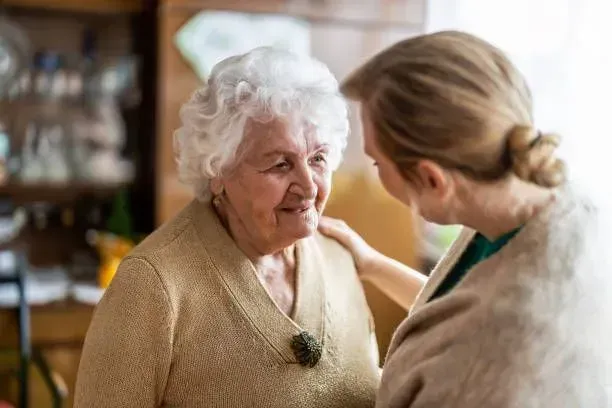Specialized Frontotemporal Dementia In-Home Care Services
The Mayo Clinic reports the most common signs of frontotemporal dementia involve extreme changes in behavior and personality. Is your loved one exhibiting any of these changes in behavior and personality?

Frontotemporal dementia (FTD) is a neurodegenerative disorder that primarily affects the frontal and temporal lobes of the brain, leading to a progressive decline in behavior, language, and/or motor function. It is one of the less common forms of dementia, typically occurring in people under the age of 65, although it can occasionally affect older individuals as well.
There are several subtypes of FTD, each with distinct sets of symptoms, including:
- Behavioral variant FTD (bvFTD): This subtype is characterized by changes in behavior, personality, and social conduct. Individuals may exhibit apathy, loss of empathy, repetitive behaviors, socially inappropriate actions, and a decline in personal hygiene.
- Primary progressive aphasia (PPA): PPA is characterized by a gradual loss of the ability to speak, understand language, read, or write. Individuals may have difficulty finding the right words, expressing thoughts, or comprehending spoken or written language.
- Semantic variant PPA: This subtype primarily affects the individual's ability to understand the meaning of words and objects. It can lead to difficulties in recognizing familiar faces or objects, as well as challenges in understanding and using language appropriately.
- Non-fluent variant PPA: This subtype is characterized by difficulty in producing speech, including speaking slowly, hesitating before speaking, and having trouble forming sentences.
The exact cause of FTD is not fully understood, but it is believed to involve the accumulation of abnormal proteins in the brain, leading to the progressive degeneration of brain cells and subsequent shrinkage of the affected brain regions. The diagnosis of FTD typically involves a comprehensive evaluation of the individual's medical history, neurological examination, neuropsychological testing, and brain imaging studies.
Frontotemporal dementia (FTD) differs from other forms of dementia, such as Alzheimer's disease and vascular dementia, in several key ways, including the following:
- Age of onset: FTD typically affects individuals under the age of 65, whereas Alzheimer's disease more commonly presents in older individuals. This difference in age of onset is one of the distinguishing factors between FTD and other forms of dementia.
- Brain regions affected: FTD primarily targets the frontal and temporal lobes of the brain, leading to changes in behavior, personality, and language skills. In contrast, Alzheimer's disease primarily affects the hippocampus and other areas of the brain involved in memory and cognitive function.
- Initial symptoms: The initial symptoms of FTD often involve changes in behavior, personality, and language, whereas in Alzheimer's disease, early symptoms typically include memory loss and cognitive decline. This difference in initial symptoms can help differentiate between the two conditions in the early stages.
- Progression of symptoms: FTD tends to progress differently from Alzheimer's disease. While both conditions are progressive and lead to a decline in cognitive function, FTD may initially present with significant changes in behavior, personality, and language skills, whereas Alzheimer's disease is characterized by a gradual decline in memory and cognitive abilities.
- Genetics: Some cases of FTD have a genetic component, with specific gene mutations being associated with the development of the condition. In contrast, while genetics can play a role in the risk of developing Alzheimer's disease, it is not typically linked to specific gene mutations in the same way as some cases of FTD.
- Prognosis and life expectancy: The prognosis for individuals with FTD can vary depending on the specific subtype and the progression of the disease. In some cases, FTD can progress more rapidly than other forms of dementia, leading to a shorter life expectancy. However, the progression and prognosis can differ significantly from person to person.
Johns Hopkins reports there are currently no treatments available to "cure or slow the progression of FTD, but healthcare providers may prescribe medicine to treat symptoms. Antidepressants may help treat anxiety and control obsessive-compulsive behaviors and other symptoms. Prescription sleeping aids can help ease insomnia and other sleep disturbances. Antipsychotic medicine may reduce irrational and compulsive behaviors. Behavior modification may help control unacceptable or risky behaviors. Speech and language pathologists and physical and occupational therapists can help adjustment to some of the changes caused by FTD."
It is important to note that the information provided here is for general knowledge purposes only and should not be used as a substitute for professional medical advice, diagnosis, or treatment. For specific concerns or questions regarding Frontotemporal dementia (FTD), it is recommended to consult a qualified healthcare professional for accurate evaluation and guidance tailored to individual circumstances.
Frontotemporal Dementia In-Home Care Services
Understanding Frontotemporal dementia (FTD) is crucial for home care service providers for several reasons:
- Tailored care: 7 Day Home Care offers personalized care that caters to the specific needs and challenges associated with FTD. Understanding the unique symptoms and behavioral changes that individuals with FTD may exhibit allows caregivers to tailor their approach and caregiving techniques accordingly.
- Effective communication: Individuals with FTD may experience difficulties in communication and language, which can impact their ability to express their needs and preferences. Caregivers who are knowledgeable about FTD can employ alternative communication strategies to ensure effective and meaningful interactions, improving the overall quality of care and reducing frustration for both the caregiver and the individual.
- Behavior management: Behavioral changes, such as social disinhibition, apathy, or compulsive behavior, are common in FTD. Having a comprehensive understanding of these behavioral patterns enables caregivers to implement appropriate strategies for managing challenging behaviors, maintaining a safe and supportive environment for the individual.
- Emotional support: FTD can be distressing for both the individual and their family members. Home Health Aides who understand the emotional impact of the disease can provide empathetic and compassionate support, fostering a sense of trust and security for the individual and their loved ones.
- Promoting engagement: Despite the challenges posed by FTD, maintaining engagement in meaningful activities can significantly enhance the individual's quality of life. Caregivers who are familiar with the interests and capabilities of the person with FTD can create stimulating and enjoyable activities tailored to their specific preferences and abilities.
- Collaboration with healthcare professionals: Understanding FTD allows the 7 Day Home Care team to collaborate effectively with healthcare professionals, including doctors, nurses, and therapists, to ensure comprehensive and holistic care for the individual. By actively participating in the care team, home care providers can contribute valuable insights and observations to the overall care plan.
At 7 Day Home Care, we are dedicated to providing specialized in-home care services tailored to the unique needs of individuals living with Frontotemporal dementia (FTD). Our compassionate and experienced caregivers are equipped with a comprehensive understanding of FTD, enabling them to deliver personalized care that fosters dignity, comfort, and a supportive environment. With a focus on effective communication, behavior management, and promoting engagement, we strive to enhance the overall well-being and quality of life for our clients and their families. At 7 Day Home Care, we are committed to providing affordable and exceptional care that prioritizes the individual's comfort, safety, and emotional well-being, ensuring peace of mind for the entire family. Call 7 Day Home Care, the most responsive team in home care today at 516-408-0034. 7 Day Home Care provides cost effective specialized Frontotemporal dementia services in Manhattan, Queens, Brooklyn, Nassau County, and Queens County, New York.
Brian Callahan
7 Day Home Care










